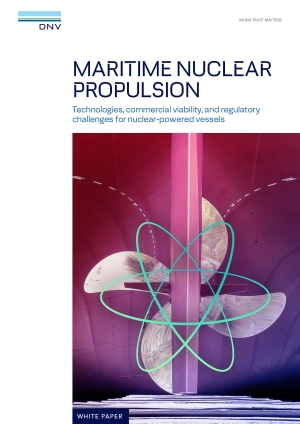


(Posted on 27/10/25)
According to a new paper by DNV, shifting environmental requirements are reigniting interest in nuclear propulsion as a long-term solution for maritime decarbonisation. This renewed attention comes despite the absence of any civilian commercial nuclear-powered vessel commissions in more than four decades.
DNV’s latest report, “Maritime nuclear propulsion: Technologies, commercial viability, and regulatory challenges for nuclear-powered vessels,” highlights how maritime nuclear technologies differ from land-based reactors, and emphasizes the need to address technological, regulatory, and commercial factors in the effort to understand the potential role of nuclear propulsion.
The paper addresses the main elements of the future maritime fuel cycle – including fuel management, waste handling, vessel construction and operation, and oversight of nuclear supply chains – and presents the reactor technologies most likely to be adopted by shipowners. Advances in automation, digitalization, and modular design are identified as critical enablers of safety, security, and non-proliferation of future nuclear fuels and reactors, thereby paving the way for public acceptance.
Knut Ørbeck-Nilssen, Maritime CEO at DNV, said: “Nuclear energy has the potential to play a role in the maritime energy transition. However, much work still needs to be done to overcome technical, regulatory, and societal challenges, including public perception. This will require coordinated global action, technological innovation, and closely aligned regulatory frameworks.”
The white paper stresses the need for a predictable and harmonized regulatory framework at both national and international levels to enable safe nuclear propulsion at sea. Regulators such as the IMO and IAEA, along with flag states, national authorities, and classification societies, must play a coordinated role and the report outlines likely regulatory roadmaps for all relevant actors, as the industry develops.
The success of any future industry will also hinge on robust, cost-effective business models. DNVs report outlines how mass production, standardization, and modularization can strengthen the business case for nuclear-powered ships. This is further underscored by a case study that shows what cost levels marine nuclear reactors will need to reach for nuclear propulsion to become viable for the merchant fleet.
Columbia Group anticipates a period of strong expansion as an increasing number of international shipowners... Read more
Norse?Ship Management has expanded its use of Smart Ship Hub’s high frequency sensor data and... Read more
As the maritime industry gears up to welcome the IMO’s STCW bullying and harassment training amendments... Read more
NORDEN has acquired the cargo activities of Taylor Maritime in Southern Africa (previously operated... Read more
Philippos Ioulianou, Managing Director of EmissionLink, has warned the IMO’s decision to delay... Read more
VIKAND has highlighted the need for cultural change in the maritime sector as reports of bullying, harassment... Read more
The maritime industry is experiencing a period of significant transformation, driven by rapidly evolving... Read more
NorthStandard has advised Members of a 5% increase in P&I premiums for the marine insurance year... Read more
Anemoi Marine Technologies, the UK-based leading designer of Rotor Sails for wind-assisted ship propulsion... Read more
Helm Operations has announced that nine electronic record books within Helm CONNECT Logbook have been... Read more